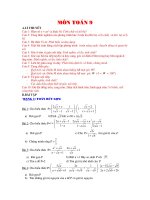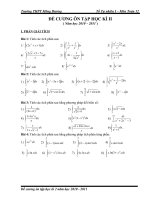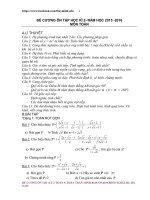đề cương ôn tập học kì 2 môn toán anh văn lớp 6 7
Bạn đang xem bản rút gọn của tài liệu. Xem và tải ngay bản đầy đủ của tài liệu tại đây (276.8 KB, 6 trang )
<span class='text_page_counter'>(1)</span><div class='page_container' data-page=1>
Page
1
<b>ĐỀ CƯƠNG ÔN THI HỌC KỲ II – TIẾNG ANH 7 </b>
<b>NĂM HỌC 2019-2020 </b>
<b>A..GRAMMAR </b>
<b>UNIT 7 TRAFFIC </b>
<b>1. IT indicating distance </b>
Sử dụng “it” làm chủ ngữ để chỉ khoảng cách
Ex: It is about 300 meters from my house to the bus stop.
<b>2. Used to </b>
Sử dụng “used to” để mơ tả một hành động, một thói quen hoặc một việc xảy ra thường
xuyên trong quá khứ nhưng bây giờ khơng cịn nữa
<i>(+)S + used to + V ( nguyên mẫu) </i>
<i>(-) S+ did not used to + V (nguyên mẫu) </i>
<i>(?) Did + S + use to + V ( nguyên mẫu) </i>
<b>UNIT 8 FILMS </b>
<b>1. Tính từ “ed” và “ing” </b>
Một tính từ có thể được thành lập bằng cách thêm “ed” hoặc “ing” sau động từ
Ví dụ Interest -> interested, interesting Disappoint -> disappointed, disappointing
- Sử dụng tính từ đi “ed” để mơ tả cảm giác, cảm xúc của một ai khi bị một sự việc, vật
tác động/
Ví dụ: The film was long, and I was bored
- Sử dụng tính từ đi “ing” để mơ tả về tính chất của vật việc
Ví dụ The film was boring.
<b>2. Từ nối ALTHOUGH, DESPITE/INSPITE OF, HOWEVER, NEVERTHELESS </b>
<b>Mặc dù </b>
<i>Although/ though/eventhough/muchas+mệnhđề// Despite/in spiteof +cụmdanhtừ </i>
<i><b>Tuy nhiên Mệnh đề. However/ Nevertheless,(dấu phẩy) mệnh đề </b></i>
<b>3. Phát âm khi thêm “ed” sau động từ </b>
<i><b>/t/ sau các âm vô thanh /ʧ/, /s/, /k/, /f/, /p/, /θ/, /∫/ </b></i>
<i>/d/ sau các âm hữu thanh </i>
<i>/id/ sau /t/, /d/ </i>
<b>UNIT 9 FESTIVALS AROUND THE WORLD </b>
<b>1. Câu hỏi với H/WH </b>
Các từ để hỏi Who, Why, Which, Whose, What, When, Where, How
1. DÙNG VỚI ĐỘNG TỪ “ TOBE”
WH+ BE +S + COMPLEMENT ?
:BE TUỲ THEO THÌ, COMPLEMENT CĨ THỂ KHƠNG CĨ.
EX: What are you doing?, where is she?, when were we silent?...
<b>2. DÙNG VỚI ĐỘNG TỪ THƯỜNG. </b>
WH + DO, DOES/ DID+ S + Vo?
</div>
<span class='text_page_counter'>(2)</span><div class='page_container' data-page=2>
2
<b>3. ĐỐI VỚI CÁC THÌ HỒN THÀNH </b>
WH + HAS, HAVE/ HAD +S +V3/ED?
EX: Why has she gone to school?, What had you eaten?...
<b>4. ĐỐI VỚI “ MODAL VERBS” HAY WILL, SHALL, WOULD, SHOULD (May, </b>
can, must, could, might, ought to, have to là modal vers)
WH + MODAL VERBS + S + VO?
EX: Why must you go?, where may she come?, what can she do?, What will she do?...
<b>5. HOW </b>
How much + N( khơng đếm được ln ở số ít) EX: how much money have you got?
How many +N( đếm được ở số nhiều) EX: how many students are there in your class?
How far: bao xa, how long : bao lâu, how often : mấy lần, thường không, how old : bao
nhiêu tuổi……
<b>Cụm trạng ngữ </b>
Sử dụng các cụm trạng ngữ chỉ thời gian, nơi chốn, mục đích để làm rõ nghĩa của câu.
- Cụm trạng ngữ chỉ thời gian: Last December, every year..
- Cụm trạng ngữ chỉ nơi chốn: In HCMC, at home…
- Cụm trạng ngữ chỉ much đích: to say thanks for what they have
- Cụm trạng ngữ bổ sung: with apricot blossoms.
<b>UNIT 10: SOURCES OF ENERGY </b>
<b>1. Thì tương lai tiếp diễn </b>
Diễn tả một sự việc ĐANG xảy ra tại một thời điểm xác định trong TƯƠNG LAI
<i>(+)S + will be+ V-ing (-) S+ will not be + V-ing (?) Will + S + be + V-ing? </i>
<i>Will not = won’t </i>
<i>Will = shall ( sử dụng cho chủ ngữ I, We) </i>
<b>2. Bị động của thì tương lai đơn </b>
<i>(+)S + will be+ V3(-) S+ won’t be + V3(?) Will + S + be V3? </i>
<i>- Sử dụng thể bị động khi tân ngữ của câu không quan trọng hoặc không biết ai là người </i>
<i>thực hiện hành động, nếu người thực hiện vẫn quan trong thì thêm sau “by” </i>
<i>- Sử dụng thể bị động khi muốn nhấn mạnh vật, việc được tác động. </i>
<b>UNIT 11: TRAVELLING IN THE FUTURE </b>
<b>1. Will (review) </b>
Sử dụng will để đưa ra một dự đoán trong tương lai.
<b>2. Đại từ sỡ hữu </b>
Subject
Pronouns
I YOU WE THEY HE SHE IT
Possessive
Adjectives
MY YOUR OUR THEIR HIS HER ITS
Possessive
Pronouns
MINE YOURS OURS THEIRS HIS HERS ITS
Đại từ sở hữu dùng để thay thế cho tính từ sở hữu và danh từ khi không muốn lặp lại danh
từ.
</div>
<span class='text_page_counter'>(3)</span><div class='page_container' data-page=3>
Page
3
----They' re her keys ===> They' re hers.(= her keys)
Như vậy ta phải nói danh từ đó trước rồi mới thay thế.
<i>Lưu ý, vì đại từ sở hữu đã thay thế danh từ nên sẽ không bao giờ có danh từ sau đại từ sở </i>
<i>hữu. </i>
Ex: My father is tall. Theirs (= their father) is short.
<b>UNIT 12 AN OVERCROWDED WORLD </b>
<b>1. So sánh số lượngLittle -> less/Few -> Fewer Many ,much -> more </b>
<i><b>Số lượng Ít hơn:S+ V+ less + N (không đếm được)/// S+ V+ fewer + N ( đếm được) </b></i>
<i><b>Số lượng nhiều hơn:S+ V+ more ( danh từ đếm được và không đếm được) </b></i>
<b>2. Câu hỏi đuôi </b>
Lưu ý
1. Câu giới thiệu khẳng định, phần hỏi đuôi phủ định.
Câu giới thiệu phủ định, phần hỏi đuôi khẳng định
2. Phần đuôi chỉ sử dụng các đại từ : I, you, we, they, he, she, it, there
3. Phần đuôi luôn ở dạng viết tắt
<b>Các trường hợp cụ thể </b>
<i>Hiện tại đơn với TO BE: </i>
- he is handsome, is he? = Anh ấy đẹp trai, đúng không?
– You are worry, aren’t you? = Bạn đang lo lắng, phải không?
<i>Hiện tại đơn động từ thường: mượn trợ động từ DO hoặc DOES tùy theo chủ ngữ </i>
- They like me, don’t they?
– she loves you, doesn’t she?
<i>Thì quá khứ đơn với động từ thường: mượn trợ động từ DID, quá khứ đơn với TO BE: </i>
<i>WAS hoặc WERE: </i>
- He didn’t come here, did he?– He was friendly, was he?
<i>Thì hiện tại hoàn thành hoặc hiện tại hoàn thành tiếp diễn: mượn trợ động từ HAVE hoặc </i>
<i>HAS </i>
- They have left, haven’t they?– The rain has stopped, hasn’t they?
<i>Thì tương lai đơn- It will rain, won’t it? </i>
<b>C. PRACTICE </b>
<b>I.Findthewordwhichhasadifferentsoundinthepartunderlined </b>
1. A.perform B.end C.festival D.elephant
2. A.cake B.celebrate C.racing D.candle
3. A.desert B.held C.prefer D.celebrate
4. A.those B.they C.than D.Thanksgiving
5. A.cranberry B.lantern C.gather D.apricot
6. A. abundant B. travelling C. character D. biogas
7. A. diverse B. drive C. invention D. crime
8. A. designs B. sails C. pedals <b> D. pollutes </b>
<b>❖ VOCABULARY AND GRAMMAR </b>
<b>II.Choose and circle the best answer. </b>
1.Many (cultural/ romance/ disappointed/ annoyed) and artistic activities are held as the
part of the flower festival in Da Lat.
</div>
<span class='text_page_counter'>(4)</span><div class='page_container' data-page=4>
4
3. Nick washes his hand a lot, (so/ and/ but/ although) he doesn’t have flu.
4. At a seasonal festival, people race down the hill to (break/ catch/ buy/ eat) cheese.
5. (When/ How/ Why/ Where) were you born? – In March
6. We will cut down on the use of natural gas because it is (plenty/ limited / available /
abundant ) & harmful to the environment.
7. Some new energy-saving bulbs (will put /will be putting/will be put /will being put)
in the dining-room.
8. Which of the following is NOT non-renewable source of energy ?
A. oil B. wind C. natural gas D. coal
9. The end of the film was so _____________ that many people cried.
A. boring B. shocking C. exciting D. Moving
10. A ___________ is a film that tries to make audiences laugh.
A. sci-fi B. documentary C. comedy D. horror
11. I found the book so ____________ that I couldn’t take my eyes off the screen.
A. gripping B. shocking C. tiring D. boring
12. We found the plot of the film__________.
A. bored B. boring C. interested D. acting
<b>III. </b> <b>Put the verbs in correct tenses. </b>
1. …………..You (wait) ………for her when her plane arrives tonight?
2. Don’t phone me between 7 and 8. We (have) ……….………….. dinner then.
3. I (send) ……….. you my book tomorrow.
5. We hope the new Director (find) ……….. more jobs for his employees.
6. Nam is a hard-working student. He (pass) ….…………. the exam easily this year.
6. What …………..you (do) ……….. when you graduate from the University?
7. Next week we (have) …..……… many kinds of examinations. It (be) …………
a very busy week, I think.
8. In the future, most of Vietnamese people (be able) ……. (speak) …English well.
9. Next week at this time, you (lie) ……….………….. on the beach.
10. …………..You (meet) ………..your former teacher at 9 am tomorrow?
<b>IVComplete the following sentences with the correct form of the words in brackets. </b>
1. There are many ... differences between the two communities. (culture)
2. Street are decorated with……….lights and red banners. (colour)
3. Margaret Thatcher. (perform)
4. There were lively New Year ………all over the town. (celebrate)
5. When we heard she’d got the job, we all went off for a ... drink. (celebrate)
6. It is in America to eat turkey on Thanksgiving Day. (tradition)
7. What forms of ………do you participate in during the festival? (entertain)
8. The hall looked verywith its Christmas tree. (festival)
9. Her eyes were wide with ……….when she heard the news. (excite)
10. The Chinese New Year marks the...of spring and the start of the Lunar
New Year. (begin)
<b>V.Put question for the underlined part of each sentence: </b>
1. It is 10 kilometers from here to ACB bank.
2. I have known Marie for nine years.
</div>
<span class='text_page_counter'>(5)</span><div class='page_container' data-page=5>
Page
5
4. Sarah left two hours ago.
5. She is watching Tom and Jerry.
6. It is an action film.
7. She likes watching comedy.
8. It starts Lee Min Hoo and Jun Ji Huyn.
9. I felt terrified before my last Maths test.
10. She felt entertained when she watched a gripping film.
<b>VI. Read the following passage, then choose a word from the box </b>
roofs garden non - polluting polluting
the moon are renewable the sun
Solar energy is a long lasting source (0)..of.. energy, and it can be used almost
anywhere. To generate solar energy, we only need solar cells and (1)...! Solar
cells can easily be installed on house (2) ..., so we don’t need any new space.
Compared to other (3)... sources, they also possess many advantages: wind
and water power rely on turbines which (4)...noisy, expensive and which take up
large space. Solar cells are totally silent and (5)... As they have no moving
parts, they require little maintenance and have a long lifetime.
<b>WRITTING: </b>
<b>VII. Rewrite the sentences so that they have the same meaning as the original ones. </b>
1. We will use renewable energy in the future.
→ Renewable energy ……….………..…
2. This is our school.
→ This school is ………..……….…
3. What is the distance between Vinh and Ha Noi city?
→ How……….?
4. I often walked to school when I was a student.
→ I used………
5. Although they are short, they still love playing sports.
→ In spite of………
6.They will use solar energy to protect the environment.
→ Solar energy ………..
7.Although she eats lots of food, she is still very slim.
→ ->In spite of ………..
8.What is the distance between Hanoi and HCM city?
→ How far ………..?
9.I find English interesting. → I am ………..…
10.Our roof will be fixed tomorrow. → They………..
<b>VIII. Complete the following tag questions. </b>
1. There’s a new cartoon, ……….?
</div>
<span class='text_page_counter'>(6)</span><div class='page_container' data-page=6></div>
<!--links-->









